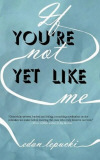If You’re Not Yet Like Me
Edan Lepucki is a master at characterization and humor. Her novella If You’re Not Yet Like Me, narrated by a pregnant woman describing to her unborn child the series of events leading to its conception, would likely be a sentimental flop if not for the enormous personality of its protagonist, Joellyn. Joellyn is a woman who boosts her self-esteem by gazing at her breasts in the bathtub faucet, whose reflection makes them huge, “the nipples wide-eyed, like they’d just walked into their own surprise party.” She is someone who imagined as a kid that she would grow up to be a Valkyrie, warrior-type woman, “vicious and beautiful, the roar of some exotic animal made physical.” She habitually imagines herself intimate with men she’s not attracted to and sleeps with them as good deeds, but wears the ugliest pair of underwear she owns on first dates to prevent herself from taking off her clothes too early.
Edan Lepucki is a master at characterization and humor. Her novella If You’re Not Yet Like Me, narrated by a pregnant woman describing to her unborn child the series of events leading to its conception, would likely be a sentimental flop if not for the enormous personality of its protagonist, Joellyn. Joellyn is a woman who boosts her self-esteem by gazing at her breasts in the bathtub faucet, whose reflection makes them huge, “the nipples wide-eyed, like they’d just walked into their own surprise party.” She is someone who imagined as a kid that she would grow up to be a Valkyrie, warrior-type woman, “vicious and beautiful, the roar of some exotic animal made physical.” She habitually imagines herself intimate with men she’s not attracted to and sleeps with them as good deeds, but wears the ugliest pair of underwear she owns on first dates to prevent herself from taking off her clothes too early.
It’s for these reasons and in this way that Joellyn picks up Zachary at a coffee shop, a man she describes as bland and invisible. She says, “The coffee shop boasts dozens of men like Zachary. They drink their coffee, they surf the internet, they work on their scripts, their cell phones waiting dumb on the table.” Yet Zachary is one of only two men she throws caution to the wind for, for whom she reveals her ugliest panties. It is on this first date, as they approach her apartment, that she becomes most vulnerable and human, thinking,
Empty wine bottles filled the recycling bin, as did—dear God—a broken-down box that had once held 40 super-absorbency Tampons. Probably, at this very moment, a cockroach was giving birth on my kitchen floor. That day, I had failed, once again, to make the bed, and my side table was strewn with used tissues, which suggested that I either had a snot problem, or that I cried myself to sleep every night. Or that, like a man, I masturbated into Kleenexes.
When she thinks of these things, she fears that Zachary will find her out, discover that her personality is a façade, after which the whole enterprise could fall apart.
The fragility of Joellyn’s self-made persona and of the narrative she keeps playing out, thinking it one she has control over, makes the novella appealing. It is an honest story told with an honest voice by a hopelessly flawed human being. Joellyn may be a self-absorbed, egotistical bitch, but it feels good to spend time with someone who is unapologetic about her imperfect past and her even more precarious future.
Lepucki pairs her novella with the story “I Am the Lion Now,” an apt companion piece which features Margaret, another expectant mother who enacts femininity unconventionally and covers up her insecurity with a fierce and confident roar. She takes baths in grimy bathtubs but doesn’t mind the filth, which won’t scrub clean: “She also kissed dogs on the mouth, didn’t wash her fruit. Let the squeamish suffer their fear.” As it turns out, it is her husband Toby who is the squeamish one, who yells “Holy fucking shit!” when a baby possum enters the house but later begs his wife to be allowed to keep and raise the infant pet. It is this gender reversal, Toby’s vulnerability and Margaret’s lack of tenderness, that makes the story poignant. Toby is the one who swaddles the tiny animal intruder in a towel and cuddles it against his chest, but it is Margaret who carries their own child in her belly, a baby that senses her unease. With an unusual omniscient point-of-view, Lepucki allows readers quick glimpses into the womb, where we see this couple’s child develop its own sense of worry and listen as its parents navigate marriage in the days before they become parents.
Lepucki has put on the page the narratives of two hugely memorable women who know exactly who they are but wonder, with motherhood looming, if they can continue to embrace their flaws when doing so might mean passing such flaws down to their children. But with enormous personalities and unavoidable quirks, it seems unlikely that Joellyn and Margaret could be anything but themselves. As readers, we can forgive them for that. We are just grateful to be with them to laugh at the humor they use to diffuse their anxiety.





